|
|
|
Sort Order |
|
|
|
Items / Page
|
|
|
|
|
|
|
| Srl | Item |
| 1 |
ID:
181136
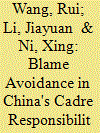

|
|
|
|
|
| Summary/Abstract |
This article contends that prior research on the behaviour of Chinese local cadres pays limited attention to their motivation for avoiding blame. Using qualitative data from three field studies conducted in Guangdong province, the study focuses on blame avoidance in the cadre responsibility system, which is recognized as an important instrument for state capacity building. Our analysis uncovers three major discursive strategies used by grassroots cadres to manage blame either before or after it is apportioned: de-legitimating performance standards, re-attributing blame and transferring blame risk. We find that local cadres have a role as blame makers in shifting blame and accusations. This finding challenges the conventional view, which typically sees local officials as blame takers. The article concludes by elaborating on the wider implications of this finding and proposing avenues for future research.
|
|
|
|
|
|
|
|
|
|
|
|
|
|
|
|
| 2 |
ID:
181142
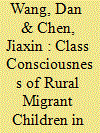

|
|
|
|
|
| Summary/Abstract |
The state of class consciousness of working-class children in China has received scant attention in the scholarly literature. This study examines the class consciousness of rural migrant children as they are about to join their migrant parents and become “China's new workers.” Qualitative investigations were conducted in two primary schools in Beijing. Focus group and individual interviews were held with 87 fifth- and sixth-grade migrant children in the two case schools and 324 valid student questionnaires were collected. The findings reveal that migrant children are aware of the unequal class relationships suffered by migrant workers; however, their interpretations of class-based injustices exhibit false consciousness, shadowed by individualism, meritocracy and the duality of images. Family and school may play vital roles in shaping migrant children's class consciousness.
|
|
|
|
|
|
|
|
|
|
|
|
|
|
|
|
| 3 |
ID:
181145
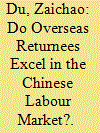

|
|
|
|
|
| Summary/Abstract |
Overseas study is a global phenomenon and a major business internationally. But does overseas study pay off? Using data from the 2015 China Household Finance Survey (CHFS), we examine the labour market performance of overseas returnees in China. To obtain more accurate results, we matched each returnee with a local so that the domestic group is as similar as possible to the returnee group. We then conducted empirical analyses of the matched data. We find that compared with domestic postgraduates, returnee postgraduates earn about 20 per cent more annually. Moreover, the salary premiums paid for foreign graduate degrees can be attributed principally to the superior human capital gained from overseas education rather than from any “signalling” effect. Also, returnees with graduate degrees are more likely to enter high-income professions and foreign-funded ventures, and to reach higher positions in those organizations. However, we find no significant differences in income, occupation choices and positions between returnee and local bachelor's degree recipients. As such, we suggest that Chinese students and their families are best served when the students obtain a local undergraduate degree and then go overseas for graduate training.
|
|
|
|
|
|
|
|
|
|
|
|
|
|
|
|
| 4 |
ID:
181137
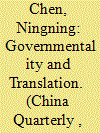

|
|
|
|
|
| Summary/Abstract |
This paper explores the cultural politics of lineage landscapes in contemporary rural China. Drawing on a combined governmentality/translation approach and ethnographic fieldwork in rural Wenzhou, it examines how the state governs the production of lineage landscapes and how local lineages translate governmental technologies in complex ways. Empirical evidence reveals that the government develops diversified rationalities and modes of governance to direct the (re)construction of lineage landscapes. It is also found that local lineages are skilled at appropriating state discourses and practices as well as enrolling other (non-)human actors, thereby legitimizing their landscape projects of ancestral tombs and memorials. On the ground, they often displace state objectives with the production of their preferred landscape (for example, “chair” tombs). Respectful of ancestors, state agents sometimes turn a blind eye to local displacement; however, while encountering challenges from the higher-level government, they intensify regulation, but lineages still retain the capacity to negotiate with them. With sensitivity to the entanglement of diversified actors and their dynamic interactions, this paper underlines the multiplicity and contingency of state governance and societal responses. It also foregrounds the cultural politics of lineage landscapes as a process of translating governmental technologies characterized by continuous mobilization, displacement and negotiation in a heterogeneous network.
|
|
|
|
|
|
|
|
|
|
|
|
|
|
|
|
| 5 |
ID:
181143
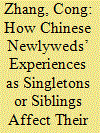

|
|
|
|
|
| Summary/Abstract |
Did growing up as singletons (only-children) convince young adults born under China's one-child policy of the superiority of singleton status and therefore the desirability of not having more than one child? This article draws on interviews with 52 childless newlyweds in Dalian, China, to help answer this question. We found that far from convincing them of the superiority of singleton status, the feelings of loneliness experienced by singletons in childhood and adulthood have convinced most of them that it is better to have a sibling than to be a singleton and thus it is better to have two children instead of one. Moreover, interviewees who did have siblings tended to corroborate singletons’ beliefs about how valuable a sibling can be in both childhood and adulthood.
|
|
|
|
|
|
|
|
|
|
|
|
|
|
|
|
| 6 |
ID:
181140
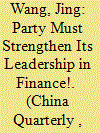

|
|
|
|
|
| Summary/Abstract |
This article examines the roles digital technologies have played in propelling the shifts in modes of financial governance which have been led by the Chinese Communist Party and enacted by a wide spectrum of regulative actors. Based on analyses of the laws, policies and regulations surrounding digital financial technologies, or so-called fintechs, as well as in-depth interviews with government officials and fintech business executives, I argue that the proliferation of fintechs challenged the existing regulatory schemes defined by the Central Bank and the State Council. This forced a reconsideration of the Chinese government's hegemonic strategies in governing the rapidly changing financial industries. While digital technologies have been promoted to accomplish the goals set by the Party for financial marketization and modernization, a set of institutions including regulatory, organizational and normative rules have been developed to strengthen the Party's control over the digitization of finance. This contradiction is pivotal to understanding the Party's financial policymaking in the digital age.
|
|
|
|
|
|
|
|
|
|
|
|
|
|
|
|
| 7 |
ID:
181138
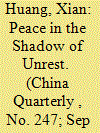

|
|
|
|
|
| Summary/Abstract |
Much research on contentious politics focuses on the origins and dynamics of contention or the impact of contention on policy change. Although some studies have delved into the state reactions to contention, relatively little is known about the outcome or effectiveness of state responses, especially in non-democratic settings. This paper attempts to fill this gap and to uncover the policy feedback effect in non-democratic settings by studying the Chinese state's repression of violent incidents targeted at healthcare personnel and facilities (yinao). I argue that without comprehensive healthcare reforms to tackle the root causes of yinao, state repression of yinao generates unintended adverse outcomes, causing the doctor–patient relationship to deteriorate. Using the difference-in-differences method with China Family Panel Studies data for 2014 and 2016, I find that the criminalization of yinao diminishes public trust in doctors and confidence in hospitals’ competence and instead increases public concerns about the healthcare system.
|
|
|
|
|
|
|
|
|
|
|
|
|
|
|
|
| 8 |
ID:
181144
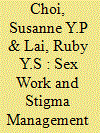

|
|
|
|
|
| Summary/Abstract |
This paper examines the impacts of state policies and NGO advocacy on female sex workers’ identity and how they manage stigma. Comparing three groups of sex workers – those born and working in mainland China, those born and working in Hong Kong, and those born in mainland China who later migrated to Hong Kong and entered the sex industry – this paper suggests that differences in state policies on prostitution and the different degrees of visibility of NGOs campaigning for sex workers’ rights are related to three strategies used by sex workers to construct a positive self-image to counteract the stigma they face: gendered obligation fulfilment, professional work and responsible citizenship. The paper illustrates that stigmatized-identity management involves complex relationships among individual interpretation, selection and mobilization of gender, work and citizenship scripts, which are contingent on structural features of the environment and may change during migration and relocation.
|
|
|
|
|
|
|
|
|
|
|
|
|
|
|
|
| 9 |
ID:
181141
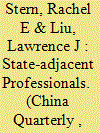

|
|
|
|
|
| Summary/Abstract |
This article complicates the conventional wisdom that Chinese lawyers are either politically liberal activists or apolitical hired guns by training our attention on the group of lawyers who choose to stand adjacent to the state and participate in governance. Through an examination of how and why winners of the state-sanctioned Outstanding Lawyer Award participate in politics, we illustrate how state-adjacent lawyers provide the state with information and persuade others to behave in ways the state considers appropriate. Although proximity to power affords some social and professional benefits, award winners are also motivated by a commitment to improving Chinese society. By highlighting the political role played by lawyers who serve as a bridge between state and society, we open the door to future research on the relationship between the state and professionals in other industries and countries, and call for continued attention to how inequality shapes opportunities for political participation in China.
|
|
|
|
|
|
|
|
|
|
|
|
|
|
|
|
| 10 |
ID:
181139


|
|
|
|
|
| Summary/Abstract |
China is witnessing a growing trend towards financialization by the state. Drawing on the concept of state-led financialization, this study is the first to explore how the government-guided investment fund (GGIF) has evolved and spread throughout the country. The promotion policies and practices of the central government have laid the key foundation for the development of GGIFs, while local governments have quickly adopted this new financial tool, resulting in its widespread take up. State-owned enterprises are heavily involved in the operation of GGIFs, indicating that this market-oriented tool has largely failed to attract capital from the private sector. This study shows that state-led financialization in China has strengthened rather than weakened the influence of the state in the economy, which is not the case in most Western economies. However, the limitations and risks of the GGIF are also related to the dominant role of the state in GGIF operations.
|
|
|
|
|
|
|
|
|
|
|
|
|
|
|
|
| 11 |
ID:
181134


|
|
|
|
|
| Summary/Abstract |
The nexus between China's human and economic presence abroad and its security policy is increasingly important. Within this nexus, this study statistically explores whether and to what extent Chinese contractors reduce the number of Chinese nationals they send to work in North Africa, the Middle East and the Horn of Africa when the security situation in host states worsens. We find no significant evidence that either warnings from Chinese embassies and consulates to leave host countries or expert perceptions of host stability influence the number of Chinese workers. Worker numbers appear to decrease significantly only in the aftermath of large-scale violent events. These findings suggest that Chinese companies are relatively acceptant of security risks and uncertainties, despite the decade-long regulatory efforts of the Chinese government to make them more security-conscious overseas and, thus, to reduce pressure to use diplomatically and economically expensive military means for their protection.
|
|
|
|
|
|
|
|
|
|
|
|
|
|
|
|
| 12 |
ID:
181135
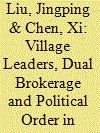

|
|
|
|
|
| Summary/Abstract |
Drawing on an ethnographic study in two counties in Hunan province, this article explores how political brokerage has contributed to political order in China by facilitating contentious and non-contentious bargaining between the government and ordinary people. To account for the changing role of village leaders in rural politics, the article develops a concept of dual brokerage. This concept not only recognizes formal and informal linkages between village leaders and the two principals – the government and the community of villagers – but also underscores the interactivity between the linkages. We contend that despite the tensions between village leaders’ roles as state agents and as village representatives, these two roles in the reform era tend to be mutually beneficial. Under such an institutional configuration, village leaders in China in the reform era have strong incentives to act as dual agents and can make policy implementation more flexible and the use of state force more moderate. A comparison between the trilateral interactions before and after the tax reform in 2005 confirms that whether village leaders can effectively act as dual agents has a significant impact on the quality of rural governance in China.
|
|
|
|
|
|
|
|
|
|
|
|
|
|
|
|
|
|
|
|
|